Kevin Clarke
Operetta Research Center
1 August, 2017
This dashing young musical comedy guy, born 1990 in Germany’s Black Forrest region near Karlsruhe, just ventured far into “enemy territory” – he performed Edwin in Kalman’s Die Csardasfürstin at the Rüdersdorfer Operettensommer 2017. A surprising choice for a festival not exactly known for flashy casting and fresh interpretations. But Christian Miebach turned out to be a smash, and certainly one of the most youthful Edwins in the performance history of that show. But he has done operetta in the past, from Die Fledermaus and Max Hansen to Wie einst im Mai. Plus, he actually teaches operetta to school kids in Berlin. So before he’s off again to sing The Wizard of Oz and Little Shop of Horrors in Magdeburg, we caught up with him for a face-to-face conversation about what he finds so interesting about the genre. And we also wanted to know how that duet with football star Manuel Neuer went at the wedding ceremony in Southern Italy.
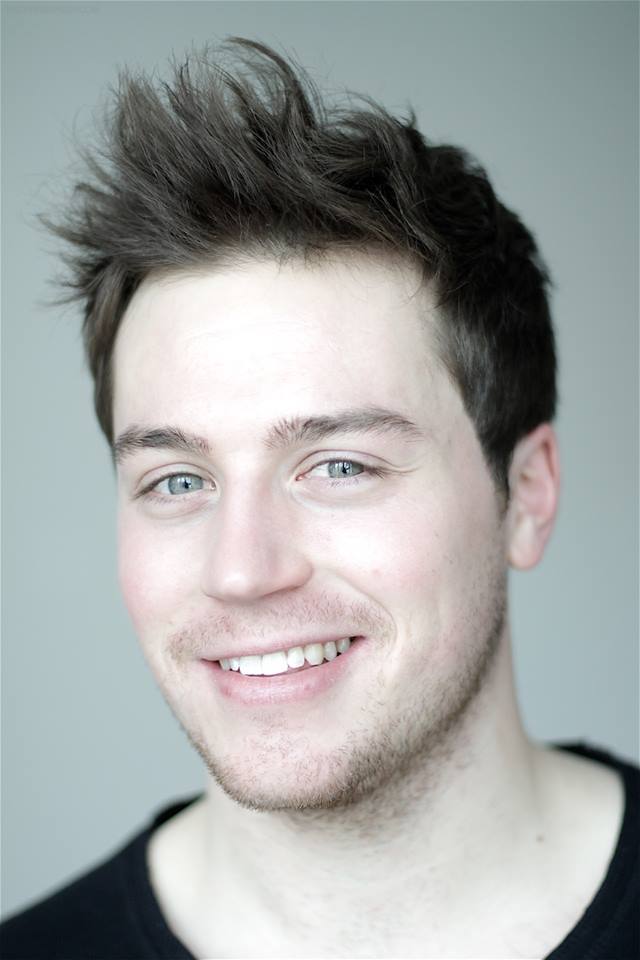
The young musical comedy star Christian Miebach. (Photo: Pascal Hoffmann)
You started your operetta career with Max Hansen und Walter Kollo, while you were still a student at the UdK Berlin. What drew you to operetta music, how did your fellow students react to you doing operetta?
In my youth I did not listen to operetta music much, although I was interested in musical theatre in general. Back then, I thought operetta was a kitschy and out-of-date art form. During my university studies, two of my professors were historian Dr. Wolfgang Jansen and pianist Adam Benzwi. They managed to stir my interest, and they taught me to love operetta. Also, at the UdK, every musical comedy student has to participate in an operetta production in the third year of studies. As a result, I got to do Alfred in Die Fledermaus, directed by our head-of-staff, Peter Lund, who is an absolute operetta aficionado. (He directed Zarewitsch in Mörbisch, Axel an der Himmelstür at the Volksoper Wien and recently Zirkusprinzessin in Graz.) After that Strauss experience, I concentrated more and more on operetta repertoire. In 2011 I won a prize at the Bundeswettbewerb Gesang with Walter Kollo’s “Es war in Schöneberg” from Wie einst im Mai which I sang at the finalists concert at Friedrichstadtpalast. Everyone loved it and complimented me on the unusual choice of repertoire.
Once I started reading about and listening to more and more operetta, I decided to do my diploma performance with a Max Hansen program. I got quite a lot of excited reactions from my teachers and fellow students. It nearly took one year of research to prepare this Hansen evening. Therefore I knew it would be a very different kind of program, compared with the other student’s diploma works. Some people complained, afterwards, that my performance was not enough “musical comedy” (e.g. my dance teacher missed the big Broadway dancing moments), others didn’t like the 1920s musical style because they prefer modern rock/pop shows. But, generally, the feedback was very positive. And I did get my diploma! (laughs)

Poster for Christian Miebach’s Max Hansen evening, 2014.
Very few musical comedy fans know operetta. How easy was it for you – as an actor and singer – to cross-over from musical comedy to chanson to operetta, and back again?
To have a well-trained instrument – a singing voice you can technically handle well – is basically the most important factor in all musical genres. But, of course, every singer needs to build up special skills for any particular direction his or her career takes. Obviously singing operetta is different to singing a rock opera or pop musical. And singibg with or without microphones makes a huge difference, too.
One of my difficulties is – as a young light tenor – that most operetta music lies pretty low, but then you suddenly have to hit these high notes that come out of nowhere. It’s a bit like Heldentenor parts, which might explain why various famous Heldentenors of the past, such as René Kollo, have sung operetta so much… Ultimately, you need both: a voice that allows for delicate and subtle interpretation (of the text and the music), and a dashing and smart stage persona that captivates the audience. Heldentenors are usually not of the subtle kind, and many of them, today, are not particularly dashing either. (laughs) So there is room for new people, like me.
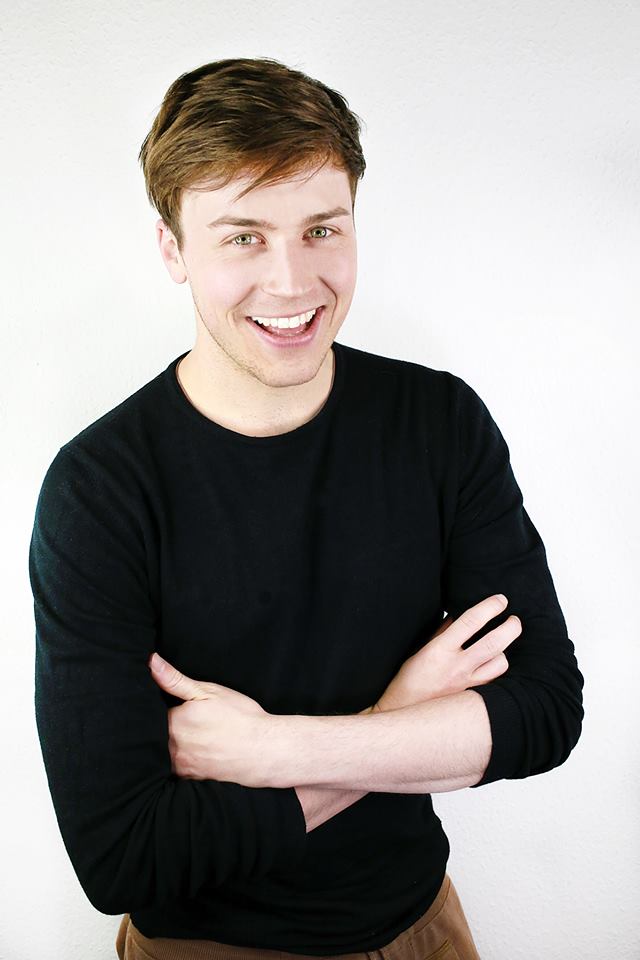
Another studio portait of Christian Miebach. (Photo: Pascal Hoffmann)
Since leaving the UdK, you have had quite a career in musicals like The Wizard of Oz and Little Shop of Horrors in Magdeburg. Are casting directors at German opera houses interested in hiring musical comedy people for operettas?
Unfortunately most German Drei-Sparten-Häuser (three genre houses: ballet, plays, and opera) hire only opera singers for their operetta productions. I also experienced some highly antiquated views regarding musical comedy, with actors being hired who are not able to sing at all. This was considered especially “authentic.” But it’s not, really. It’s more of a missed opportunity, for everyone. And it remains a missed opportunity in Germany!
You just sang Edwin in Csardasfürstin at the Rüdersdorf Sommeroperette. How did you get involved with that production? What made you want to sing Kalman?
To tell you the truth: it started with me getting a casting request from my agent. I was quite excited because it was the first chance I ever got to audition for an operetta. But I was very uncertain whether I should apply or not, because I knew that usually opera tenors sing that part. As a result the audience has certain expectations, especially when we’re talking about such a well-known show.
But the auditions were an enriching experience. Instead of a short impersonal 1-2 minute session – enter, sing a song, no times to deliver any text, go home again – like in most of my previous auditions, the Rüdersdorfer Operettensommer director, Stephan Wapenhans, worked with me and I felt a really good relationship.

Christian Miebach as Edwin with Ilonka Vöckel as Sylva in “Die Csardasfürstin” in Rüdersdorf, 2017. (Photo: Petra Fleischer)
When I heard that I was hired, I was thrilled. And terrified at the same time, because of the vocal demands of the part. I was also worried because there was so little time to actually prepare for the role. But I got great support from my vocal coach, as well as from my partner. Plus, it’s always stimulating to work with Kalman’s beautiful music.
The productions in Rüdersdorf are known to be very old-fashioned. Did you enjoy working there, as a young performer?
By successfully type casting all the lead roles, our director created a mixed but homogenous ensemble which included different kinds of performers. For instance, there was our Csardasfürstin, Ilonka Vöckel: she is a classic soprano, trained by Ingeborg Hallstein. Our director, Stephan Wapenhans, on the other hand played Feri Basci as an actor with a character voice. And then there was former East German schlager star Regina Thoss as Anhilte.
Getting the whole production ready in just 4 weeks (including frequent absences of colleagues) was a challenge and quite strenuous. The final rehearsals turned out to be really tiring, and although we never managed to do a proper run-through, we had a successful opening night and string of week-end performances in July. Even though it rained so often!
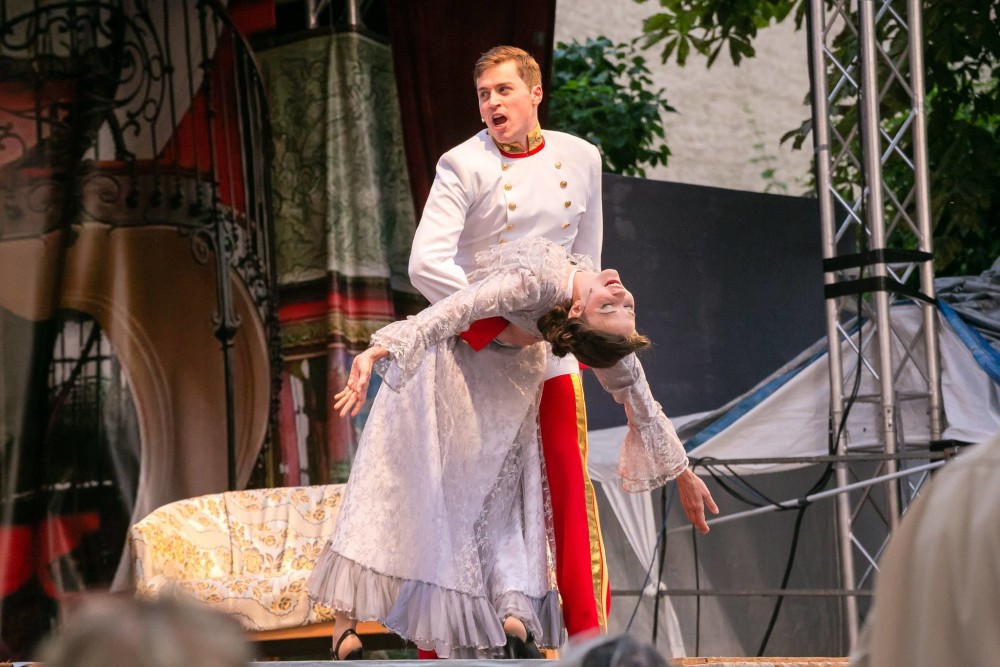
Christian Miebach in “Die Csardasfürstin” in Rüdersdorf, 2017. (Photo: Petra Fleischer)
The audience in Rüdersdorf is very enthusiastic. Most of them know Kalman’s music and join in for the chorus. Our director told me that he primarily stages “entertainment” when I asked him about the show’s various other levels, e.g. the whole WW1 background. The result was a cute and amusing comedy which included moments of touching honesty and love. Our romantic setting – in the middle of a garden with a 17th century building in the background and a lovely river floating by – made for some enjoyable summer evenings.
You’re a very young Edwin. What new aspects did you bring to the role?
Well, I m certainly not a classically trained opera singer with maximum volume. But I am a young musical comedy performer. That means I can sing the part in a more straight forward and natural way, and I can play Edwin as the charming prince and brash youth! It’s important that the audience understands why Sylva falls in love with this youngster – and not with a middle aged man, which is what you see in most other productions. The libretto says Edwin was a student when he got engaged to Stasi and this was five years before the actual plot takes place. So I assume he just finished university, which means he must be in his early twenties. Before getting married and settling into his role as head of an aristocratic family he wants to enjoy life in bohemian Budapest. It was important for me to show that Edwin has honest feelings for Sylva, otherwise why would she consider giving up her career and entire previous life for him?
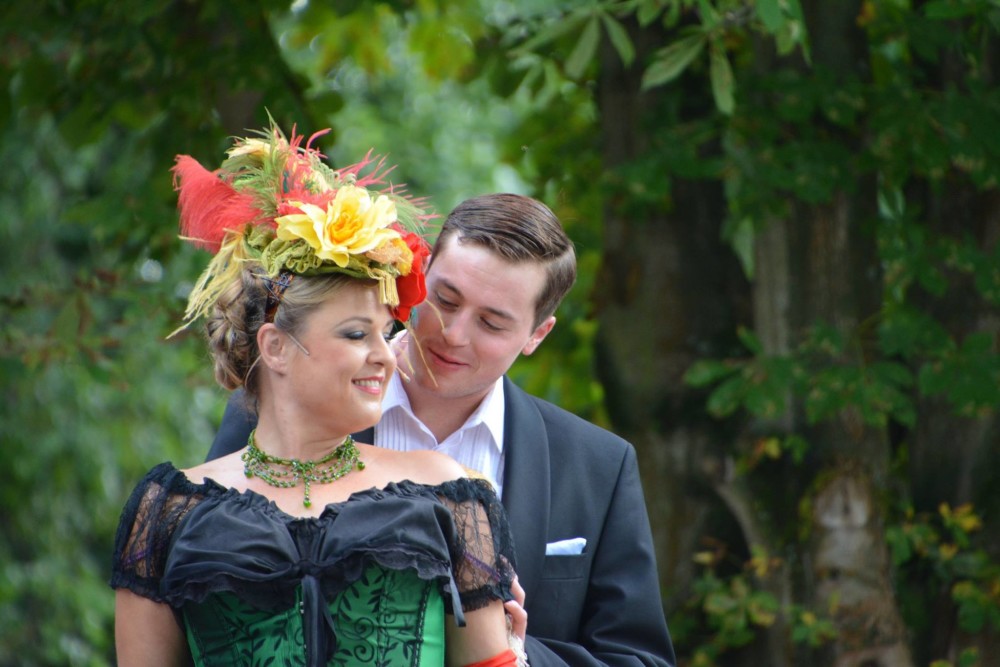
Christian Miebach as Edwin with Ilonka Vöckel as Sylva in “Die Csardasfürstin” in Rüdersdorf, 2017. (Photo: Petra Fleischer)
Talking of honest feelings and weddings: you recently sang at the wedding of German national football team player Manuel Neuer….. which is definitely not a place where you usually encounter operetta singers. How did that come about?
His wife heard me singing during the Easter mass in my Catholic church, here in Berlin, and she told the priest to contact me because she wanted me to sing at her wedding in Italy. Two weeks later I met the priest and the lovely couple, and we discussed the musical program for their wedding. Singing for them both and their many guests in the cathedral of Monopoli – one of the most beautiful churches in Apulia – was an truly unforgettable experience. And of course the party was gorgeous beyond words.
Wouldn’t Mr. Neuer be a great choice for a performance of Roxy und ihr Wunderteam? Would you duet with him for Abraham?
Exactly! (laughs) I got to know him as a smart and charismatic man, and I really appreciate his simple and clear way of speaking in front of a big audience, which is a useful actor’s skill in my opinion – to move people. In addition, by taking dance and voice training, he did a pretty awesome job moving around and singing himself at the wedding. As we discussed the musical program in our first meeting, Manuel and I sang a church song together, a song he still knew from his time as an altar boy.
Well … it’s only a small step from altar boy to Abraham!
(laughs)
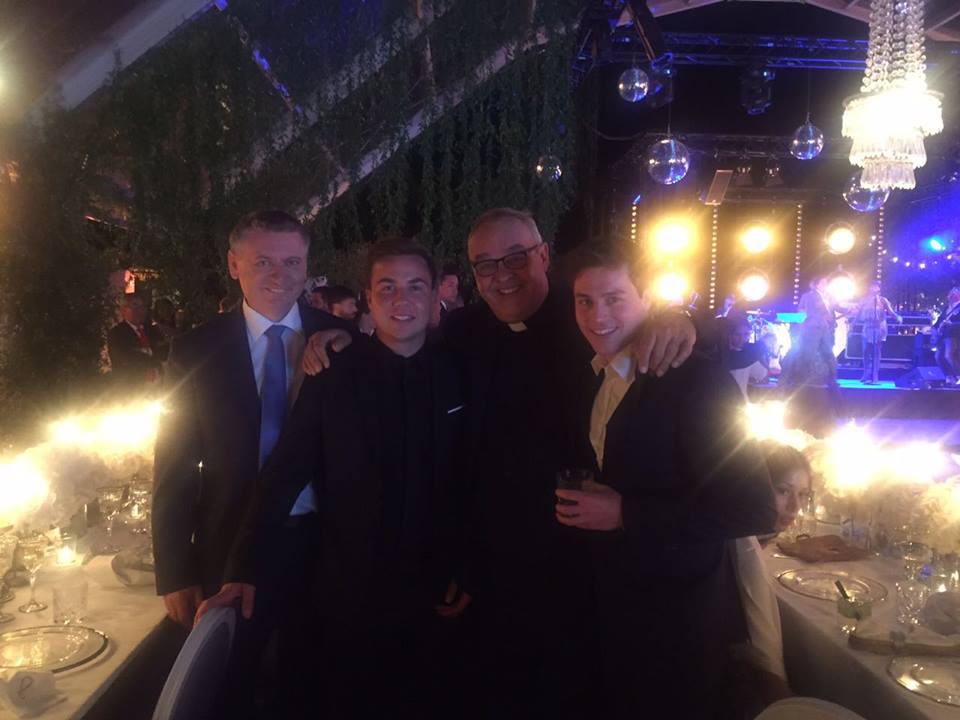
Christian Miebach (r.) with the priest and various wedding guests. (Photo: Private)
You teach operetta at the school workshops of the Komische Oper. What reactions do you see to operetta there, from young people?
I was chosen to be one of the coaches for the Komische Oper’s project “Oper sucht Klasse” in 2015. It was a kind of casting show and it involved practicing a short Ball im Savoy program with kids aged 14 to 15. They loved the Komische Oper’s Savoy production because of the snappy staging and choreography by Barry Kosky and Otto Pichler. They also loved the groovy musical arrangements of conductor Adam Benzwi.
Because this project was such a success, the Komische Oper decided to establish a club for teenagers who want to explore musical theater more deeply. The club is called “Opernscouts,” i.e. opera scouts, and it was established in 2016. I’m teaching the kids how to “express themselves” by training them to act, sing and dance. We do that once or twice a month. Because of the Komische Oper’s successful operetta repertoire, we have focused on that. And the kids love it! When I was asking what they would like to sing next, they answered: more music from Ball im Savoy. It’s amazing to see how well Abraham works with that generation.
In my experience the kids enjoy the theatre’s live atmosphere, which is new to most of them, and then they are drawn in by the plot. The music comes later. So we need productions that tell stories in a fresh and convincing way. And we need performers who make these stories believable and interesting. Beautiful singing is not enough to hold the attention of a 15 year old for 3 hours. They want spectacle and total involvement.
What’s your own favorite operetta recording?
Obviously, I adore all Max Hansen and his recordings which I added to my cell phone song library in 2013 – and which I have been listening to ever since, on and off.
Also, I really like the Ball im Savoy highlights recording from 1932 with Gitta Alpar and Oscar Denes. These original 1920s Berlin operetta recordings have such a wild, boisterous sound, at the same time they can be incredibly delicate. And the always display musical virtuosity. And fun. I never get tired of listening to them, which I cannot say about too many later operetta recordings.
And then I love the music from Bernstein’s Candide, ever since I was 16. I guess that should have been an early warning sign of where I might go in my life. I like both the 1991 recording – with the great Christa Ludwig as the Old Lady and Bernstein conducting – and the 2005 New York Philharmonic DVD version, because I adore Patti Luponeand Kristin Chenoweth asreal musical comedy performers. Also, that production presents a great way to stage the piece. And, yes, I’d like to sing Candide one day, but maybe not in Rüdersdorf! (laughs)
